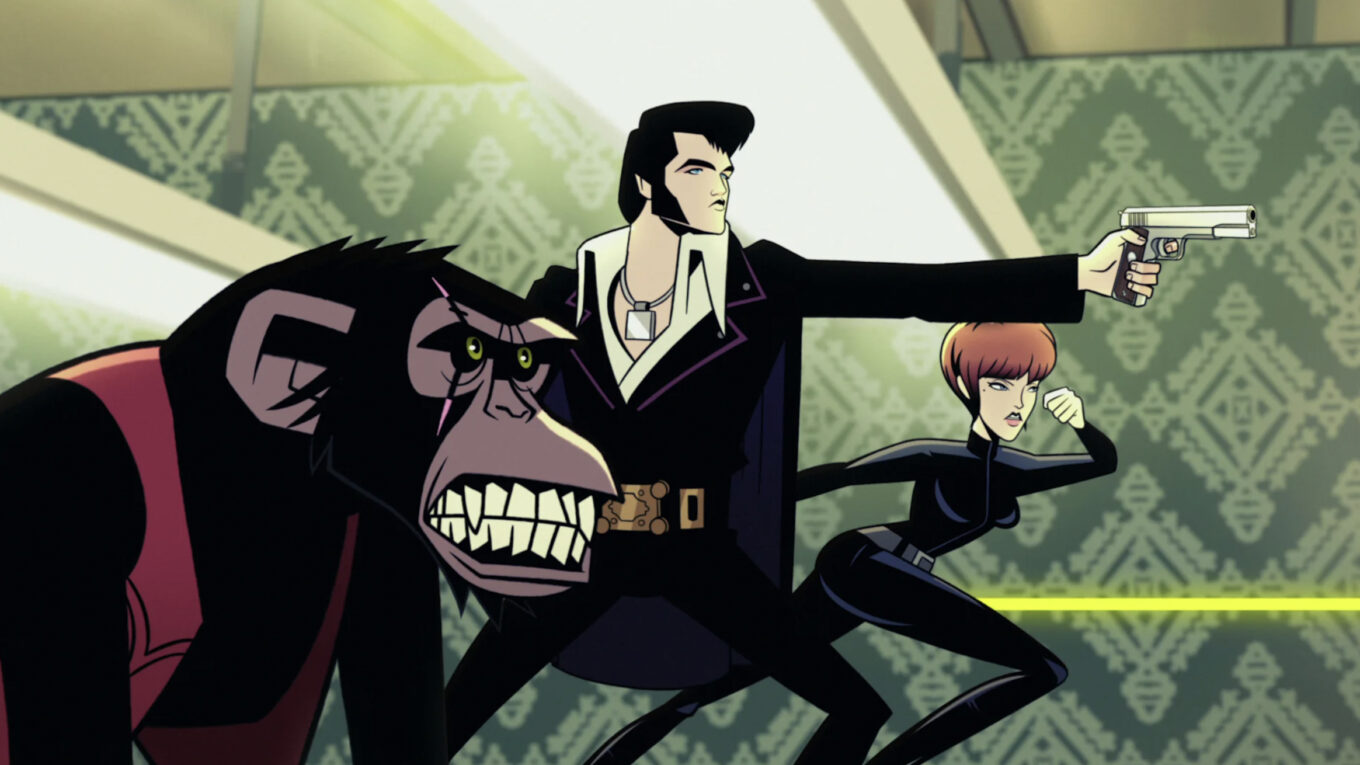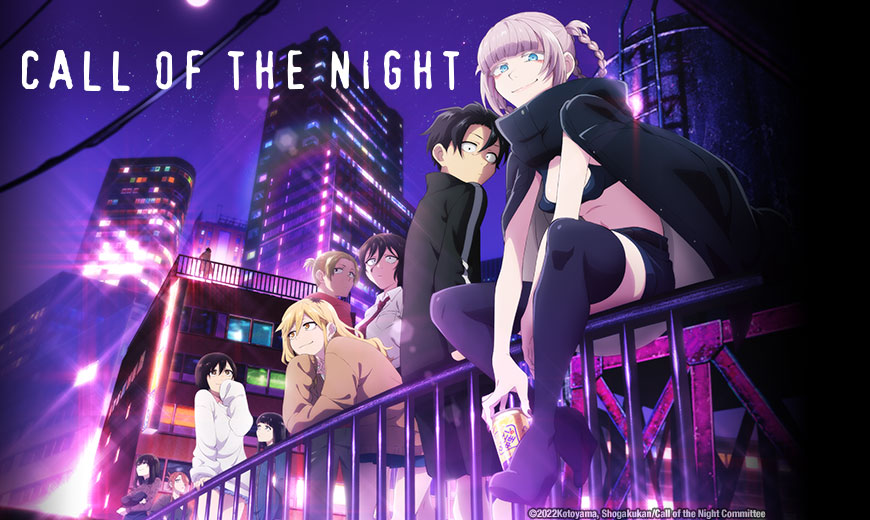Season Review: Agent Elvis Season One
Overview:
Agent Elvis shines up its blue suede shoes and mousses back its hair for this radical alternate take on history that argues that Elvis Presley, American entertainer, is actually an accomplished secret agent super-spy in addition to a musician and actor. Elvis boldly braces for adventure as he valiantly defends his country against dark forces and corrupt evil, all while he juggles an increasingly complex double life as a beloved performer and family man. Elvis’ eclectic pursuits reach a tense fever pitch and if he doesn’t hit the right notes then his career, and country, may go up in flames.
Our Take:
A series like Agent Elvis that prides itself in its unabashedly weird nature requires a comedic legend or animation auteur to help tie its manic ideas together and make them work. Agent Elvis comes from perennial Elvis experts, Priscilla Presley and John Eddie. Their vote of confidence is certainly encouraging for this “all-access” exaggeration of the King’s life, but it doesn’t necessarily result in a good animated comedy series. Agent Elvis would really benefit from an Adam Reed or Matt Thompson, who were responsible for Archer. Curiously, Agent Elvis is developed by Mike Arnold with help from Matt Roller and Mark Ganek, all of whom have been instrumental during Archer’s genre-heavy “coma seasons” and beyond. Arnold, Roller, Ganek, and Adult Swim’s Casper Kelly do commendable work with this broad concept, but in the end Agent Elvis is destined to feel derivative of this more-popular adult-animated spy series.
Agent Elvis is cut from the same cloth as other anachronistic history-supernatural genre mash-ups like Mike Tyson Mysteries, Jackie Chan Adventures, or even Abraham Lincoln Vampire Hunter, but it doesn’t feel like it brings enough to the table. Agent Elvis ends up relying too hard on the “so random” nature of its premise. Beyond the ridiculous concept where Elvis Presley is a secret agent (something that he actually asked President Nixon if he could do) who handles Americana missions like helping directors fake the moon landing, there’s very little to grab onto here. It’s Archer meets Forrest Gump, with a dash of Axe Cop and Venture Bros. thrown in for good measure, but filtered through an exaggerated kids’ book report.
In Agent Elvis’s defense, this shaggy hound dog of a show does progressively find its footing as the season progresses. An increased confidence in its stories and characters helps bolster the season’s second-half. That being said, Agent Elvis still ultimately feels unnecessary and an idea that might have worked better as an economical movie instead of an ongoing series that cycles through the same ideas. Each globe-hopping episode chronicles Elvis’ convoluted attempts to make the country that he loves a better place while he takes on exaggerated figures from history like Charlie Manson, Dean Martin, and Timothy Leary. Howard Hughes even functions as Agent Elvis’ kooky mad scientist Krieger surrogate. All of this alternate history mayhem never properly justifies itself, even if it’s fun to watch Elvis take on hippie zombies or fight off Manchurian Candidate-like brainwashing.
Every Agent Elvis episode showcases an extravagant body count with copious bloodshed, all of which gets presented through a frenetic editing style that prioritizes cutaway comedy so that as many gags can be crammed into an episode as possible. There’s no denying that a lot happens in each episode of Agent Elvis, but none of this heightened material sticks (especially Scatter’s coked-up simian shenanigans). Actual Elvis music is routinely used to conclude or introduce each episode in attempts to thematically tie everything together. It all feels a little too lazy, pat, and reliant upon the presumed brand-name prestige of Elvis Presley. Under all of this swagger and sex energy is a silly case of style over substance that amounts to a fun, fairly harmless, animated comedy.
The animation is another serious sticking point with Agent Elvis that ultimately holds it back and pushes it further towards polarizing territory. The work done by Sony Pictures Animation is not quite on the medicore level of a Flash production, but there’s a homogenized feel that doesn’t do Agent Elvis any favors. The style is reminiscent of the early seasons of Archer, but the visuals lack the same detail and nuance. It’s unfortunately the show’s character models, Elvis included, that look the weakest. There are certain frames where characters and environments are more successful. Furthermore, the series’ action sequences–of which there are many–are a consistent highlight and the show’s secret weapon.
Fletcher Moules of Entergalactic fame handles most of the season’s directing duties and it’s his distinct vision that feels the most responsible for these unrestrained pockets of ambition that occasionally take over the action and shot composition in Agent Elvis. These stylized instances of set dressing do a lot of the heavy lifting in each episode (truly, some of these landscapes at sunset are breathtaking), but these fancy visual flourishes are empty without quality writing to fall back on.
These spectacles are a joy to watch. However, at the end of the day this is supposed to be a comedy and not just an animated action show. There’s just not enough of a personality in the animation to push it that extra mile and help Agent Elvis become anything more than a hard-to-believe punchline. That’s not to say that an immaculate animation studio with a sturdier vision for the series would turn Agent Elvis into must-watch television, but it’d help. It’d at least be a series that would have me curious to check out a second season and see how these elements can continue to evolve. As it stands, Agent Elvis, despite the remarkable voice talent that’s assembled here, feels like it overstays its welcome and belabors the joke at only ten episodes. Agent Elvis may not have officially left the building, but common sense truly has.
Agent Elvis has good intentions, but in the end it feels like it’s several decades two late and a show without a real audience. It’s possible that something like this could have worked in a condensed quarter-hour format during the infancy of Adult Swim, Spike TV, or even airing alongside Archer during a time when both animated programs could feed off of and improve each other. Agent Elvis is harmless enough, but there’s nothing here that hasn’t been done much better in several other shows. Agent Elvis just doesn’t need to exist and its survival would be frustrating during a time when so many quality, creative animated series are meeting mass exodus on streaming services. Die hard Elvis fans are likely to get a little extra kick out of Agent Elvis, but it also feels like the show skews drastically younger to a point where these people aren’t the show’s primary demographic. Agent Elvis is good for a few laughs, but it can’t live up to its own legend and confidently carry a tune.
Elvis Presley used to say, “When things go wrong, don’t go with them.” If one wants to properly follow the King’s advice here then it’d be smart to drop Agent Elvis and its atonal melody.

























"There are also other characters that come and go (also owned by the Warner Bros. Discovery conglomerate media company)."
Huh. Is that just referring to other characters from the show itself, or is this implying that the new season is going to have cameos from other WBD IPs